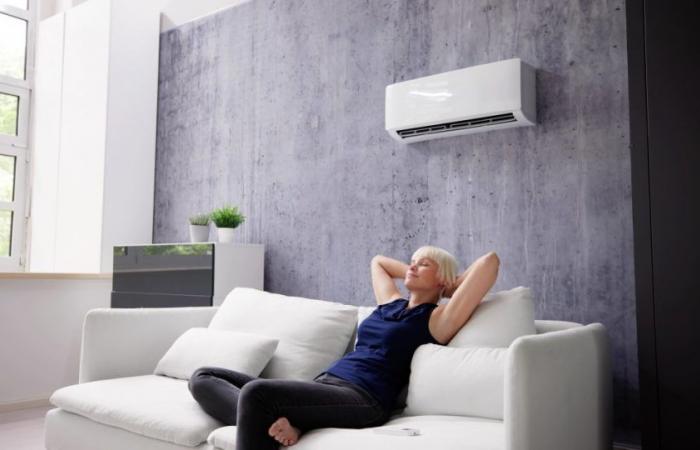(Bild: Andrey_Popov / Shutterstock.com)
Rising temperatures in cities are endangering health. Air conditioning is becoming more attractive for many households, as old cooling methods are often inefficient.
It is hot in Germany’s cities, and temperatures are expected to continue to rise in the coming years. One reason for this is climate change, which is leading to more frequent high pressure weather conditions and thus heat waves.
Advertisement
Concrete, glass and metal: materials that store heat
Another reason is the materials that cities are made of, such as concrete, glass and metal. They store heat, according to the Helmholtz Climate Initiative. In addition, a large part of the surface is sealed, so less water can evaporate and the city cools down.
Glass facades, for example, can focus sunlight like a magnifying glass and increase the temperature even further. The colors of a city also influence the temperature. Dark facades heat up more quickly than light ones.
Urban heat islands: Up to 10 degrees warmer than the surrounding area
For all these reasons, the difference between large cities and rural areas can be as much as 10 degrees Celsius. But even in smaller cities, heat stress continues to increase in summer.
According to the Helmholtz Climate Initiative, in the 1950s there were an average of about three “hot days” in Germany, i.e. days with temperatures of 30 degrees Celsius and more. Between 1991 and 2019, their number rose to an average of 8.8 days per year.
During the same period, the number of cold days, when temperatures remain below 0 degrees Celsius, has decreased, falling from 28 to 19 days per year.
Health risks from heat in the city
This development poses health risks primarily for city dwellers. Pollutants accumulate in the air and put a strain on the respiratory system. If temperatures do not fall below 20 degrees at night, many people can no longer get a restful sleep. In the worst case, according to the Helmholtz Climate Initiative, cardiovascular disease or kidney failure are a risk.
Air conditioning in Germany: Only one in five people owns one
Although summers are getting hotter and cooling down living spaces is a health hazard, only a small proportion of households in Germany currently have air conditioning. A representative survey commissioned by the comparison portal Verivox found that 19 percent of respondents now have air conditioning. An increase of six percent.
According to the survey, a good two thirds (69 percent) of air conditioning users use a mobile device, a so-called monoblock system. The warm air in the room is led outside through the window via an exhaust hose. Almost a third (31 percent) have a permanently installed split system in which the fan and compressor are outside.
81 percent of respondents currently manage without air conditioning, but 19 percent are planning to purchase one. 53 percent said the main reason was that they wanted to prepare for warmer summers due to climate change. 40 percent find other cooling methods too inefficient and 30 percent want to be prepared for high temperatures because they work from home.
Reasons for not using air conditioning
Many are put off by the high purchase and operating costs (49 percent). Others prefer to cool down with shade or fans (45 percent) or have a good indoor climate anyway (38 percent). The fact that air conditioning is harmful to the environment only plays a role for 23 percent.
Of those who do not have an air conditioner and do not currently want to buy one, 42 percent can imagine buying one if the devices become cheaper. If temperatures rise significantly in the future, 41 percent would consider buying one, and if they become more environmentally friendly, 29 percent would do so.







